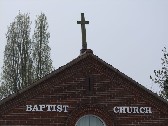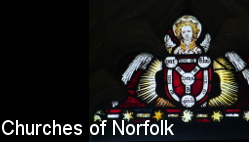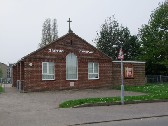| |
|
Witard
Road Baptist Church, Norwich
 |
|
This
functional, busy chapel sits on the edge of the
Heartsease estate on the eastern side of the
city. These days, the Baptists are one of the
three major Churches in England, third in size in
terms of their congregations only to the
Catholics and the Anglicans, while other
non-conformist denominations seem to be rapidly
falling away, of which more in a moment. Of
course, the Baptist tradition has always been a
strong one in East Anglia, particularly in
Suffolk, and particularly in rural areas. In the
19th Century, Baptist chapels would attract huge
crowds, but TCB Timmins, in his commentary on Transcripts
from the 1851 Census of Religious Worship,
makes the interesting point that, while the
Baptists already had more non-conformist chapels
in East Anglia than any other denomination, they
were mainly based in rural areas, and the Baptist
chapels in towns generally had smaller
congregations than other chapels. Timmins
suggests that this may be because urban
populations tended to be more liberal, and the
'Strict and Particular' strain in East Anglian
Baptist theology was more attractive to the rural
poor. |
Be that as
it may, by the middle of the 20th Century the Baptist
movement had a strong foothold in Norwich, and when the
post-war estates were built churches were planted from
existing communities, including this one, which opened in
1960. The frontage on Witard Road is simple and clean,
with red brick offsetting a tall arched window, and a
rather precarious stone cross above. The building is
surprisingly long, and yet, like most urban Baptist and
Catholic churches, it is no longer really big enough for
all the people who want to worship there. The homely
building belies the fact that, rebadged as WRBC, the
community presents itself as one of the more go-ahead
Faith communities in the city. There are two main strands
in Baptist theology, one more outward-looking and liberal
than the other, and it is these more evangelical liberal
churches which are experiencing the growth and
development in urban areas.
Christianity
is, of course, a tremendously intellectual and complex
religion. The great virtue of the modern Baptist churches
is that they are able to present it as simple, and in so
doing make it attractive to people responding to 'the
God-shaped hole in all of us', people who may have
resisted and rejected the Churches in which they were
unwillingly brought up.
Roger
Scruton, in England: an Elegy, observed that, in
urban 19th Century England, Nonconformism was not
merely a religious protest. It was a protest against the
Anglican vision of England, as an Arcadian landscape
enchanted by its law and institutions, and made holy by
ritual and prayer. For what relevance did this vision
have, to those who had fled the countryside where they
had been threatened with starvation, to the great, bleak
smoke-filled cities where nothing was promised except a
wage? But when the Anglican Church lost sight of its
sacramental character, began to play with 'Alternative
Services' and camp-fire hymns, permitting divorce and
remarriage and trivialising its communion, the
Non-Conformist Churches vanished over night. What
Scruton is suggesting, of course, is that the
non-conformist Churches of England filled a need that no
longer exists, and broadly speaking he is right - except
in the case of the Baptist movement, which continues to
go from strength to strength. As the Church of England
slowly sinks out of sight, and Christianity in this
country realigns itself between Catholic and Protestant
poles, it is fascinating to ponder that the liberal
Baptist tradition of churches like WRBC may well become
the mainstream Protestant Church in a country which is
increasingly divorced from the enchantment of its past.
|
|
|

